Elijah Wald – Talking 'Bout Your Mama: The Dozens, Snaps, and the Deep Roots of Rap
[Home] [Bio] [Jelly Roll Blues] [Robert Johnson] [Dave Van Ronk] [Narcocorrido] [Dylan Goes Electric] [Beatles/Pop book] [The Dozens] [The Blues] [Josh White] [Hitchhiking] [Other writing] [Musical projects] [Joseph Spence]
A history of the street insult game that has inspired artists from Jelly Roll Morton to Zora Neale Hurston to NWA, previously published in hardcover as The Dozens: A History of Rap's Mama.
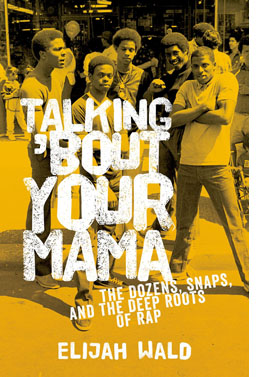 Oxford University Press, 2014.
Oxford University Press, 2014.
"This impeccably researched study of the classic black insult game may be the funniest work of serious scholarship ever published."
--Terry Teachout, Artsjournal
"The dozens is the most ephemeral and most contextual of the black verbal traditions, hence the hardest to get a handle on. But after reading Elijah Wald's superbly researched and splendidly written book, no one will have any doubt what this important black verbal tradition is and means."
--Bruce Jackson, author of "Get Your Ass in the Water and Swim Like Me": Narrative Poetry from Black Oral Tradition
"My father told us to never let a white man tell you how to be black, never let a woman tell you how to be a man, and to always make it sexy. This book is sexy... and poignant, smart and a piece of history."
--Schoolly D
"The influential African-American vernacular verbal art called 'the dozens' are in very good hands here. Wald gives them the detailed, broad, and serious consideration they have long deserved."
--Tricia Rose, author of Black Noise and The Hip Hop Wars
"This has got to be the dirtiest scholarly book ever!"
--Susan McClary, author of Feminine Endings: Music, Gender, and Sexuality
".jpg) The more Wald insists on taking both turns at the crossroads--simultaneously asserting that the dozens is a rural Southern black ritual and stressing its heterodox urbanity and pan-linguistic sampling--the more recklessly fun his book becomes....virtuosic..."
The more Wald insists on taking both turns at the crossroads--simultaneously asserting that the dozens is a rural Southern black ritual and stressing its heterodox urbanity and pan-linguistic sampling--the more recklessly fun his book becomes....virtuosic..."
--Joshua Cohen, Harper's Magazine
"The Dozens is a profanely sacred history lesson that vacillates between monster one-liners and carefully articulated deep thoughts.... Wald...is your only plausible tour guide, capable of illuminating both the blunt simplicity and fraught complexity, the cheerful frivolity and deadly severity of it all."
--Rob Harvilla, Spin
"Wald... scrapes the white man's version of black history against black reality to spark one hell of a discussion of this elusive and ephemeral ancestor of some of today's most popular music."
--Preston Lauterbach, The Wall St. Journal
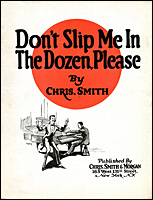
“The dozens” is a tradition of African American street rhyming and verbal combat that ruled urban neighborhoods long before rap. At its simplest, it is a comic concatenation of “yo' mama” jokes. At its most complex, it is a form of social interaction that reaches back to African ceremonial rituals. Whether considered as vernacular poetry, verbal dueling, a test of street cool, or just a mess of dirty insults, the dozens has been a basic building block of African-American culture. A game which could inspire raucous laughter or escalate to violence, it provided a wellspring of rhymes, attitude, and raw humor that has influenced pop musicians for a century. This book explores the depth of the dozensí roots, looking at mother-insulting and verbal combat from Greenland to the sources of the Niger, and shows its breadth of influence in the seminal writings of Richard Wright, Langston Hughes, and Zora Neale Hurston; the dark humor of the blues; the hip slang and competitive jamming of jazz; the edgy brilliance of generations of black comedians; and the raw language and improvisatory battling of rap. A forbidden tradition that has survived for well over a hundred years below the surface of American popular culture, the dozens links children's clapping rhymes to low-down juke joints and the most modern street verse to the earliest African American folklore. In tracing the form and its variations over more than a century of African American culture and music, The Dozens sheds new light on schoolyard games and rural work songs, the literature of the Harlem renaissance and the flowering of blue nightclub comedy, and pop hits from ragtime to rap.
Chapters and examples:
1. A Trip down Twelfth Street
A quick trip through the many ways the dozens has intersected with American culture, from the streets of New Orleans to the pages of Ralph Ellison and Nikki Giovanni, from jazz to rap, and from the most subtle insider codes to the ancient and aggressive "anglo saxon monosyllables" that remain the basic currency of adolescent street talk. (Photo: the New Orleans banjo player and guitarist Danny Barker, whose reminiscence begins this journey.)
2. The Name of the Game
What does "dozens" mean, and how did it get to be the name for filthy rhymes and insult dueling? There is no single answer, but the search for explanations takes us from Medieval Latin church verses to the slave plantations of the American South. Sources range from minstrel shows to juvenile delinquents, Scottish etymology, and musicians from the Mississippi Sheiks to Chuck Berry.
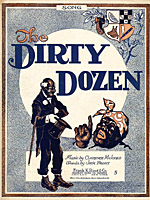 3. Singing the Dozens
3. Singing the Dozens
The first solid documentation of the dozens is from African American vaudeville, and the term was first defined in a pop song from 1921,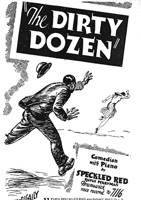 "Don't Slip Me in the Dozens, Please," recorded by the black vaudeville comedian Henry Troy with piano accompaniment by the song's composer, Chris Smith. This chapter traces the tradition in early African American entertainment, with Jelly Roll Morton providing hints of the raunchier fare that was barred from theater stages.
"Don't Slip Me in the Dozens, Please," recorded by the black vaudeville comedian Henry Troy with piano accompaniment by the song's composer, Chris Smith. This chapter traces the tradition in early African American entertainment, with Jelly Roll Morton providing hints of the raunchier fare that was barred from theater stages.
4. Country Dozens and Dirty Blues
In the 1920s and 1930s, a wave of "race records" made African American singers and musicians into national stars. Some of these artists came out of the rough Mississippi barrelhouses, and a pianist named Speckled Red had a major hit with "The Dirty Dozen," a cleaned up version of one of his barroom standards, which was covered by everyone from Memphis Minnie to Count Basie.
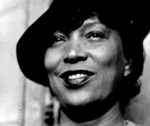 5. The Literary Dozens
5. The Literary Dozens
While vaudeville and records give a taste of professional dozens songs, the writers of the  Harlem Renaissance provided varied vignettes of verbal street dueling. Dozens matches turn up in the first black detective novel, and in the works of Richard Wright, Zora Neale Hurston (in picture), Ralph Ellison, and Langston Hughes.
Harlem Renaissance provided varied vignettes of verbal street dueling. Dozens matches turn up in the first black detective novel, and in the works of Richard Wright, Zora Neale Hurston (in picture), Ralph Ellison, and Langston Hughes.
6. Studying the Street
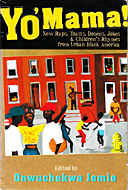 In 1939, the first academic paper on the dozens was published in a journal co-founded by Sigmund Freud. By the 1960s, folklorists, sociologists, and sociolinguists were recording street speech in blackneighborhoods across the United States (pictured: a collection by Onwuchekwa Jemie). Some of the writing was dry, some of the conclusions were quirky--but whatever the strengths and weaknesses of the academic interest, an amazing wealth of dozens lines, insult interchanges, jokes, and rhymes was preserved. (Meanwhile, Bo Diddley provided a sample of a typical, unrhymed dozens duel on his 1959 hit, "Say Man.")
In 1939, the first academic paper on the dozens was published in a journal co-founded by Sigmund Freud. By the 1960s, folklorists, sociologists, and sociolinguists were recording street speech in blackneighborhoods across the United States (pictured: a collection by Onwuchekwa Jemie). Some of the writing was dry, some of the conclusions were quirky--but whatever the strengths and weaknesses of the academic interest, an amazing wealth of dozens lines, insult interchanges, jokes, and rhymes was preserved. (Meanwhile, Bo Diddley provided a sample of a typical, unrhymed dozens duel on his 1959 hit, "Say Man.")
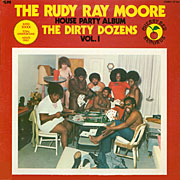 7. The Martial Art of Rhyming
7. The Martial Art of Rhyming
Insult rhymes were only part of the dozens tradition, but they were always street corner favorites and inretrospect are an obvious source for rap rhyming and battling. They were also a fine way to show offimprovisatory or theatrical verbal skills, from schoolyard jumproping songs to late-night verbal sparring. (Incidentally, an astute reader has noticed a connection I missed: I write about Rudy Ray Moore joking that he'll combat karate with "ka-razor," but didn't note that this same joke was made a couple of years earlier in James Brown's "The Payback." Moore's comment is longer and funnier than Brown's, and my guess is that this was a popular joke before either recorded it, yet another example of black street speech surfacing on records long after it spread in the community.
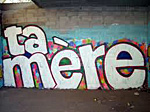 8. Around the World with Your Mother
8. Around the World with Your Mother
The dozens is at heart an African American tradition, but there are insult duels in many other cultures, from ancient Egypt to the drum fights of Greenland and Turkish rhyming duels, and mother-insulting can be found from Polynesian atolls to North Africa, and more recently throughout Europe--as for example in the French "Yo' momma" competitions (only they say "Ta mère") that have become popular at francophone hip-hop conventions.
While in most of the world mother-insulting seems to be largely an adolescent or hostile behavior, in much of Africa there are traditions of using dozens-style insults for ceremonial purposes, as well as to accompany combat, or just to get a laugh. African diaspora cultures of the Americas have further developed these traditions, and though none quite matches the U.S. dozens, there is a deep family resemblance throughout the Black Atlantic. (Check out this video of Emiliano Zuleta and Lorenzo Morales, two giants of Afro-Colombian vallenato, revisiting their classic insult duel, "La Gota Fria".)
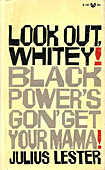 10. Slipping Across the Color Line
10. Slipping Across the Color LineLike jazz, blues, and hip-hop, the dozens was born in African American culture but soon expanded beyond its original neighborhoods. Black teens played the dozens on their white counterparts, and white kids formed their own variations. (Somehow, when I wrote this chapter, I left out by far the most popular dozens line in white U.S. culture: "Your mother wears army boots!" I don't know what I was thinking...)
11. Why Do They (We) Do That?
As soon as writers took notice of the dozens, they began to spin theories about why and how the tradition emerged, and what it means, and whether it is valuable folklore or violent, filthy, self-hating garbage--discussions that in many respects mirror later discussions of rap lyrics.
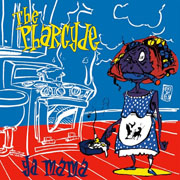 12. Rapping, Snapping, and Battling
12. Rapping, Snapping, and Battling
The dozens is a basic building block of rap rhyming and MC battling, and the rise of hip-hop brought new attention to the old tradition, spawning books and TV shows dedicated to "snaps" and "yo' mama jokes." This chapter goes into the connections between old and new, looking at developments in the last thirty years and some of the ways rappers have made use of the dozens. In the course of the research, I came across the first interviews ever done with rap fans about rhyming, by the New Jersey State folklorist at a youth detention facility, and have posted some of those transcripts here. An astute reader has drawn my attention to an early example of dozens-based rap that should definitely have been in the book, Wuf Ticket's "Ya Mama," from back in 1982.
Finally, here's a match I attended and quote in the book, Johnny Boston battling Gat Man Jones for the local championship at the Dublin House, Dorchester, Massachusetts, May 2011:
Review by Preston Lauterbach in the Wall Street Journal.
Review by Paul Devlin in the San Francisco Chronicle (reprinted in New Orleans and Salt Lake City)
Review from the Buffalo News.
Review by Michael Lindgren in the Washington Post.
Interview from the Boston Globe.
Interview on the SOHH hip-hop web site.
Interview on the Urban Revival web site
Radio interview on WNYC's Soundcheck.
One-hour radio interview for Wisconsin Public Radio (click this link, then search "Wald")
Call-in show on Kansas City's KCUR.
Radio interview on WBUR's RadioBoston.
Press site for The Dozens.